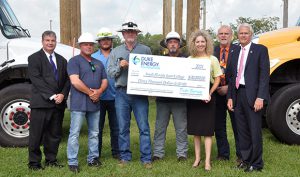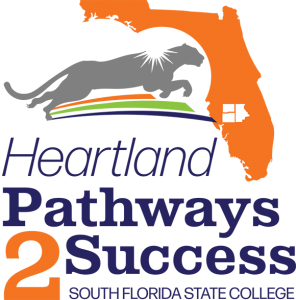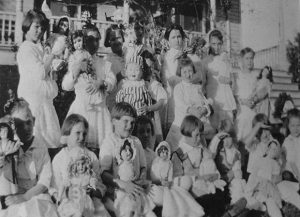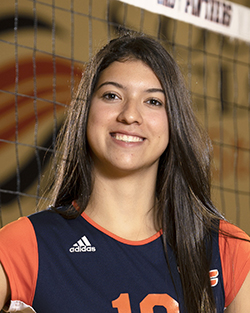AVON PARK, Fla. – Sept. 24, 2021 – Journey back through time and recapture the wonderful way that children play with their toys at the “Florida Girls and Boys and Their Toys” exhibition from Oct. 6 – Dec. 13 at South Florida State College’s (SFSC) Museum of Florida Art and Culture (MOFAC).
This traveling exhibit from the Museum of Florida History features 30 vintage photos of children and their toys from the 1890s to 1971. A collection of work by Sebring artist Mary Seigfreid titled, “Textured Constructions,” includes children’s vintage playthings.
The variety of toys highlighted in the exhibit include a rare Bing Pygmyphone, antique dolls, a 1940s handmade rocking horse, and an assortment of games. Photos include a Sebring boy with a pull dog toy from the 1920s, Jessie Ruth Stokes of Arcadia and her sailor boy doll, and Auburndale children in their Sears, Roebuck and Co. Western gear circa the 1930s.
“The oldest toy is a stuffed bear that dates back to 1871,” said Cindy Garren, director of cultural programs at SFSC. “The exhibit will definitely bring back fond memories of our favorite toys.”
MOFAC is open Wednesday through Friday from 12:30 to 4:30 p.m. Admission is free. Face masks are expected, but not required. The Museum is located on the Highlands Campus at 600 West College Drive in Avon Park.
Kelly’s Bistro on the Bay, the campus cafeteria, serves breakfast and lunch. “We invite kids at heart to visit the SFSC Highlands Campus for lunch and then tour MOFAC,” Garren said.
Volunteers are also needed to serve as docents. No experience is necessary. To volunteer or for more information about the exhibition, contact Dale McDaniel, MOFAC manager, at 863-784-7240.

Duke Energy representatives presented a check for $30,000 to SFSC for its Electrical Lineworker program. Pictured (left): Dr. Sidney Valentine, SFSC vice president for academic affairs and student services; Chris Yeomans, SFSC electrical distribution professor; Tanner Bell, Duke’s Highlands Operation Center lineworker; Kirby Whitehouse, Duke’s Highlands Operation Center lineworker; Chris Stutler, Duke supervisor of customer delivery operations; Jamie Bateman, SFSC executive director for institutional advancement; Erik Christensen, SFSC dean of applied sciences and technologies; and Dr. Thomas C. Leitzel, SFSC president.
AVON PARK, Fla. – Sept. 10, 2021 – South Florida State College (SFSC) received a $30,000 grant from Duke Energy Foundation to create powerful communities in the College’s district of DeSoto, Hardee, and Highlands counties through its initiative, Increasing Training Opportunities for Electrical Lineworker Students by Expanding Training Capacity and Improving Safety.
This grant will infuse SFSC’s Electrical Lineworker Program with enhanced and updated equipment, increased training capabilities, enhanced readiness for job opportunities, and preparation for natural disasters, such as hurricanes.
SFSC’s Electrical Lineworker Program prepares students to work as electric line technicians in the construction, maintenance, and repair of electric utility overhaul and underground systems. Through 1,500 contact hours of training at the College’s Hardee Campus, students gain an understanding of electrical systems, operations, and safety while mastering competencies in electrical distribution, basic electrical theory, and underground electrical construction operations. They learn how to maintain electric power systems and use electrical distribution equipment. The program provides practice in climbing, framing, building single and three-phase overhead lines, pole top and bucket rescue techniques, operating bucket trucks, and maintaining and repairing underground systems. Students who successfully complete the program earn a Career Certificate.
“Duke Energy is such a valuable partner to SFSC,” said Jamie Bateman, executive director for institutional advancement at SFSC. “Its determination to see our students succeed in the Electrical Lineworker Program is evident from the continued support through the Duke Energy Foundation Grant. We are so grateful to Duke Energy and look forward to continuing in working closely with them as we move the bar of excellence higher throughout the Electrical Lineworker Program.”
SFSC is one of 24 organizations in Florida to collectively receive $734,000 in grants from the Duke Energy Foundation.
“Supporting educational and workforce development initiatives like this one at South Florida State College is an integral mission of the Duke Energy Foundation,” said Melissa Seixas, Duke Energy Florida state president. “Our Foundation’s workforce grants support vital programs and help develop diverse workforce pipelines needed to strengthen our communities and economies today and in the future.”
The Duke Energy Foundation’s Powerful Communities program makes strategic investments to build powerful communities where natural resources thrive, student can excel, and a talented workforce drives economic prosperity for all. The Foundation annually distributes over $30 million to communities throughout Duke Energy’s seven-state service area.
For more information about SFSC’s Electrical Lineworker Program, contact Christopher Yeomans, electrical distribution professor, by emailing yeomansC@southflorida.edu or calling 863-784-7045.
DUKE ENERGY FOUNDATION
The Duke Energy Foundation provides philanthropic support to meet the needs of communities where Duke Energy customers live and work. The Foundation contributes more than $30 million annually in charitable gifts and is funded by Duke Energy shareholder dollars. More information about the Foundation and its Powerful Communities program can be found at duke-energy.com/foundation.
Duke Energy (NYSE: DUK), a Fortune 150 company headquartered in Charlotte, N.C., is one of the largest energy holding companies in the United States. It employs 30,000 people and has an electric generating capacity of 51,000 megawatts through its regulated utilities and 3,000 megawatts through its nonregulated Duke Energy Renewables unit.
| Number: | 10 |
| Name: | Isabella Hurtado |
| Position: | Right Side |
| Height: | 6’3″ |
| Hometown: | Sophomore |
| Class: |
Cali, Columbia |
 AVON PARK, Fla. – Sept. 3, 2021 – South Florida State College (SFSC) has been awarded a $2.7 million grant through the U.S. Department of Education Office of Postsecondary Education. The monies will fund the College’s Heartland Pathways 2 Success Project (HP2SP) over a period of two years.
AVON PARK, Fla. – Sept. 3, 2021 – South Florida State College (SFSC) has been awarded a $2.7 million grant through the U.S. Department of Education Office of Postsecondary Education. The monies will fund the College’s Heartland Pathways 2 Success Project (HP2SP) over a period of two years.
SFSC is one of 61 colleges and universities across the United States to receive such funding. In fact, SFSC is one of only three Florida educational institutions to receive this funding, along with Palm Beach State College and North Florida State College in Madison.
HP2SP has been developed to increase educational access and opportunity for low-income, minority students through the creation of technology-enabled courses and targeted dual enrollment offered directly in five high schools in SFSC’s rural service district of Highlands, Hardee, and DeSoto counties. Dual enrollment is a program that allows high school students to take college courses and earn college credit while still attending high school. SFSC will partner with school districts to address critical educational gaps experienced by students.
“The COVID-19 pandemic presented SFSC and other educational institutions with challenges to educational access, delivery, and continuity of instruction,” said Dr. Thomas C. Leitzel, SFSC president. “As an institution that continuously seeks to expand and improve its services to meet the changing needs of prospective students, current students, and the community, this grant offers the College an opportunity to do just that. With the ability to provide students with a combination of degree pathways, expanded HyFlex and online courses, virtual SIM labs, and increased dual enrollment opportunities, SFSC can ensure instruction that promotes access and equity throughout its rural central Florida district.”
Through HP2SP, the College will create an infrastructure for effective HyFlex course delivery. HyFlex (or hybrid-flexible) courses combine online and classroom-based instruction to maximize flexibility and course accessibility. Upgrades of classroom hardware, software, and interactive technologies will facilitate student engagement. Faculty and staff will be trained and supported in learning how to use the technology effectively. Through the use of HyFlex course delivery, SFSC will be able to expand the number and variety of dual enrollment courses offered at five high schools in its service district.
A virtual SIM lab will be created at SFSC. Health science degree programs require patient interaction hours and these hours can be partially completed by using high-fidelity simulators (SIMs). The virtual patient simulators assist in training students in clinical skills, such as making diagnoses. To maintain academic quality for critical health care training programs, such as registered nurse (RN), licensed practical nurse (LPN), paramedic and emergency medical technology (EMT), and health care certifications, SFSC will upgrade its SIM Lab to facilitate virtual simulation to support online, remote access.
The College will expand and promote degree pathways. Guided pathways provide students with clear academic program maps, help students choose and enter pathways, provide support services to help students stay on track, ensure that students are learning, and provide students with career development support. SFSC has established Panther PATHways for Health Sciences, Public Safety, and Science, Technology, Engineering, and Mathematics (STEM) degrees and careers. However, pathways for five remaining metamajors will be created: Arts, Humanities, Communication, and Design; Business; Education; Industry/Manufacturing and Construction; and Social and Behavioral Sciences and Human Services. Emphasis will be placed on bridging them to dual enrollment options and workforce/job opportunities.
For more information on SFSC’s Panther PATHways, visit Panther PATHways.






